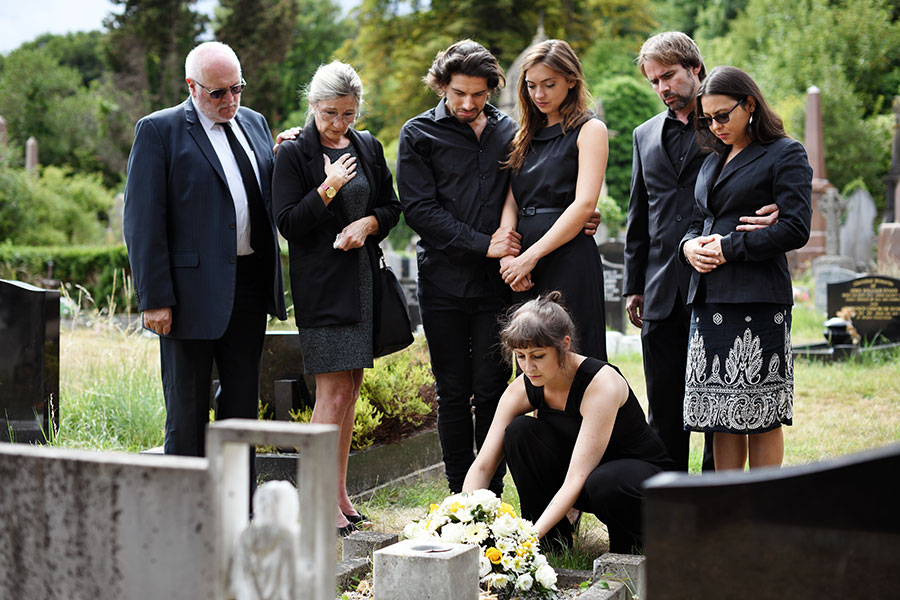Workplace Death Claims
This is precisely why reaching out to a wrongful death attorney in Southeastern Michigan is a crucial step for you to consider, and we offer an initial consultation at no cost. It’s possible that you could be eligible for death benefits through workers’ compensation. We possess the capability to potentially initiate a wrongful death lawsuit against a third party that bears responsibility for your loved one’s untimely passing.
CraneRayes is committed to offering legal guidance and advocacy for individuals who have suffered injuries or the loss of dear ones due to workplace accidents. Arrange a complimentary and commitment-free consultation with one of our skilled workers’ compensation attorneys in Wayne County, Oakland County, and Macomb County to assess your situation and explore your legal avenues. We empathize with the challenges you’re facing and are steadfast in our pursuit of securing equitable compensation on your behalf.
We charge no upfront fees of any kind because we work on contingency – we get paid only if you do, which means we operate without any upfront charges; our fees are contingent on your success, ensuring our alignment with your interests.
Since 1995, attorney Steve Crane has successfully represented persons with their legal matters.
As an experienced lawyer, Steve can gauge when it makes sense to go to court. He knows that a letter or phone call — with proper wording and timing — can be more effective or cost-efficient than suing for damages or injunctive relief.
For those cases that must be presented to a judge or jury, he is eminently qualified to assert your interests.
If you have sustained a workplace injury, call Steve free. He and his team can assess the facts of your case and help you determine the best course of action to move forward.
To schedule a discrete and confidential consultation about your matter, call Steve free at (888) 855-4400.
Death benefits
Worker’s compensation serves to provide financial assistance to employees who sustain injuries or lose their lives due to workplace accidents. This encompasses offering compensation to their dependents in case of the employee’s demise.
Nevertheless, the worker’s compensation system also safeguards employers from legal action related to work-related injuries or fatalities, even if the employer’s negligence or contribution to a hazardous work environment is evident. Workers and their families relinquish the right to sue the employer for non-tangible losses tied to the deterioration of their quality of life or companionship.
Even in cases where employers have violated safety protocols set by the Occupational Safety and Health Administration (OSHA), the worker’s compensation structure remains intact. This is attributed to the system being a no-fault arrangement. If an injury occurs during the regular course of an employee’s duties, benefits are granted regardless of fault. These benefits can encompass covering medical expenses and providing compensation for temporary or partial disabilities.

Who is eligible for death benefits?
Entitlement to death benefits hinges on being wholly or partially dependent on the deceased employee’s financial support at the time of the accident. This includes:
- Spouses/domestic partners
- Children
- Parents
- Grandparents
- Grandchildren
- Siblings
- Aunts
- Uncles
- Nieces and nephews
Certain family members automatically qualify as total dependents as per the law:
- Children below 18 years of age
- Adult children incapacitated physically or mentally, unable to earn income
- Spouses who earned $30,000 or less in the 12 months prior to the employee’s demise
Does workers’ comp cover death?
In Michigan, workers’ comp covers a death occurring on the job or during the scope of the decedent’s employment. Qualifying dependents can receive up to 500 weeks of wage loss benefits from workers’ comp. This is based upon the after-tax average weekly wage of the deceased employee. A $6,000 burial expense is also available.
What does workers’ compensation pay?
In Michigan, workers’ compensation death benefits, also known as survivor benefits, are paid to eligible dependents when someone dies in a work-related accident. The amount payable is generally 500 weeks of work comp benefits at the employee’s compensation rate. This is your exclusive remedy against the employer.
Unfortunately, the value of these benefits is small compared to the pain of losing a loved one. Michigan workers’ comp is not always a fair system.
Loss of consortium and other damages, like pain and suffering, are unavailable.
Who is entitled to collect after someone dies in a work-related accident?
Workers’ compensation death benefits (aka survivor benefits) are paid eligible dependents after someone dies in a work-related accident in Michigan. There must be at least one dependent to qualify for survivor benefits. Dependency is a complicated legal issue and you cannot just rely on common sense. Multiple dependents must share in any recovery.
A spouse must prove that he or she was dependent on the deceased worker to receive workers’ comp benefits. A spouse could be found to be wholly or partially dependent. This determination can be very complicated as several factors must be considered. Some factors include whether the spouse receives income from another source and how much the deceased worker contributed to the surviving spouse. If the spouse is found to be partially dependent, he or she will still receive 500 weeks of compensation but at a reduced rate.
If a child under the age of 16 dies in a work-related accident, they are wholly dependent and entitled to 500 weeks of compensation. A child over the age of 16 may have to prove factual dependence. Children over the age of 16 may be considered wholly dependent and entitled to 500 weeks of compensation if they are physically or mentally incapacitated from earning and living with the parent if they die in a work-related accident. After 500 weeks of compensation, a child may be entitled to continuing benefits until age 21 under certain circumstances.
How do you calculate the worker’s compensation rate for a survivor’s loss?
You can calculate the compensation rate using the employee’s average weekly wage. Take the highest 39 paid weeks in the last 52 and divide by 39. If an employee worked less than 39 weeks, divide the total amount paid by the total weeks worked. Include overtime and any premium pay in the weekly amounts.
The amount of wage loss benefits that a survivor can receive will be 80 percent of the after-tax average weekly wage. This amount is usually about 60 percent of the employee’s gross income. These benefits are income tax-free and should be paid weekly. You can also negotiate a settlement and get these benefits paid as a lump sum.
Are workers’ compensation death benefits capped?
The highest compensation rate allowed in 2023 was $1,095 per week.
No worker is allowed to receive compensation above 90 percent of the state average weekly wage. This can be extremely difficult for a family who lost a high-wage earner. The compensation rate is fixed at the time of injury.
What if there are no dependents?
Workers’ comp only pays $6,000 for a burial allowance if there are no dependents. However, a deceased worker’s estate could have a claim for benefits that should have been paid before they died.
How do I know if I’m receiving the correct amount of survivor benefits?
The best way to ensure you receive the correct survivor benefits is to speak with an experienced Michigan work compensation lawyer. Insurance companies frequently make mistakes — and they are never in your favor.
Are workers’ compensation death benefits taxable?
In Michigan, workers’ compensation death benefits are tax-free.

How are death benefits paid?
Death benefits are typically disbursed in installments at the same rate as the deceased employee’s temporary disability rate, which is no less than $224 per week. This temporary disability rate equates to two-thirds of the employee’s average weekly earnings.
However, minor children continue to receive benefits at the temporary disability rate until the youngest child reaches 18 years old. For example, if the temporary disability rate was $900 per week and the employee had a spouse and a five-year-old child, both the spouse and child would receive $900 per week until the total reaches $290,000. This spans approximately seven years, and the child would be 12 years old. The child could then continue receiving benefits at $900 per week for another six years until turning 18.
How can I file a claim for death benefits?
There’s a one-year deadline from the date of the loved one’s death to file for death benefits. The employer’s worker’s compensation insurance provider conducts an in-depth inquiry into the claim, examining the cause of the injury and death.
By law, the claims administrator must reach a decision within a reasonable timeframe. If a denial letter isn’t received within 90 days of filing the claim, it’s reasonable to assume approval.
However, the employer or their worker’s compensation insurance provider may challenge the work-related cause of death, leading to denial of the claim. In such instances, legal professionals can aid in appealing the denial and guiding through each stage of the process.
The intricate worker’s compensation process doesn’t need to be navigated alone after the passing of a loved one. Should assistance be required in filing a claim or challenging a denial, the wrongful death lawyers at Berry, Smith & Bartell possess the expertise and legal know-how to provide support and advocate for one’s best interests.

Can I file a wrongful death lawsuit against my loved one’s employer?
While surviving family members can’t litigate against the employer in the context of a workplace incident, they may pursue a wrongful death lawsuit if the death is attributed to a third party.
To initiate such a lawsuit, it’s necessary to establish that the loved one’s demise on the job was due to the negligence of a third party. Third parties who could be held accountable encompass:
- General contractors or subcontractors failing to ensure a safe work environment
- Manufacturers producing and selling defective or poorly designed products
- Drivers causing motor vehicle accidents due to intoxication or distraction
- Criminal suspects causing violent assaults on those carrying out work duties
Furthermore, harm resulting from the loved one’s death must be demonstrated. This harm can take the form of damages like lost wages, diminished earning capacity, and intangible losses such as decreased quality of life, loss of companionship, and physical and emotional suffering.
It’s the compensation for these intangible losses that distinguishes wrongful death claims from worker’s compensation claims. A Fresno wrongful death lawyer can ascertain eligibility for a lawsuit on behalf of the deceased and facilitate holding negligent third parties accountable.
Who is eligible to file a third-party lawsuit?
In California, only specific individuals can initiate a wrongful death lawsuit. These individuals encompass the surviving spouse, domestic partner, or children of the deceased employee. In the absence of such individuals, the right to file a lawsuit can extend to anyone entitled to the deceased employee’s property or estate. This might involve the deceased employee’s parents or siblings, depending on who was living with them at the time of death.
Surviving family members can seek various damages in a wrongful death claim, which might include:
- Funeral and burial expenses
- Medical bills accrued before the loved one’s demise
- Lost income, including potential earnings that would have been amassed
- Loss of services, care, assistance, and other previously provided benefits
- Additional damages like pain and suffering
Bakersfield wrongful death attorneys work to ensure that surviving family members receive the complete value of their claims.
Is there a deadline for filing a wrongful death claim?
A statute of limitations mandates that lawsuits be filed within a specified timeframe. In California, a wrongful death lawsuit must be initiated within two years from the date of the loved one’s death. Failure to file within this timeframe results in the forfeiture of the right to do so.
However, the discovery rule provides an important exception to this statute. It applies in cases where it wouldn’t have been reasonable for a person to be aware of grounds for a lawsuit. For instance, if a reasonable person wouldn’t have known that a third party was involved in the workplace death. Nevertheless, once awareness of grounds for a lawsuit arises, it’s necessary to file within one year.
A wrongful death lawyer can clarify these exceptions and guide individuals through the entire legal process, advocating for their best interests.
QUICK LINKS
Who is eligible for death benefits?
Does workers’ comp cover death?
What does workers’ compensation pay?
Who is entitled to collect after someone dies in a work-related accident?
How do you calculate the workers’ compensation rate for a survivor’s loss?
Are workers’ compensation death benefits capped?
What if there are no dependents?
How do I know if I’m receiving the correct amount of survivor benefits?
Are workers’ compensation death benefits taxable?
How can I file a claim for death benefits?
Can I file a wrongful death lawsuit against my loved one’s employer?
Who is eligible to file a third-party lawsuit?
PRACTICE AREAS
